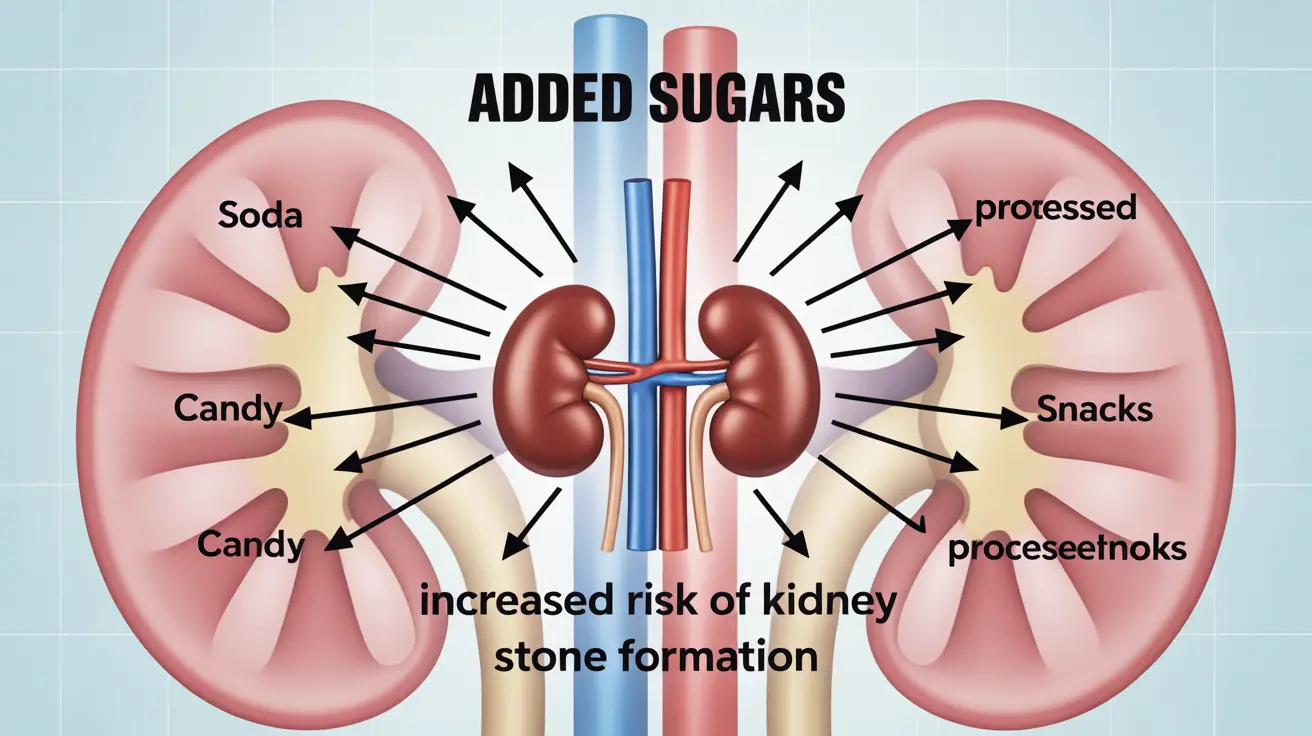If you're concerned about kidney stones, understanding how your diet affects their formation is crucial. Recent research has highlighted a significant connection between added sugar consumption and the risk of developing kidney stones. This comprehensive guide explores the relationship between sugar intake and kidney stone formation, offering practical advice for prevention.
How Sugar Impacts Kidney Stone Formation
Sugar consumption can influence kidney stone development through several mechanisms. When you consume excessive added sugars, your body experiences metabolic changes that may increase the concentration of stone-forming minerals in your urine. Additionally, high sugar intake can lead to increased calcium excretion through the kidneys, potentially promoting calcium oxalate stone formation – the most common type of kidney stone.
Common Sources of Added Sugars to Watch
Being aware of hidden sugar sources in your diet is essential for kidney stone prevention. Common sources include:
- Sweetened beverages (sodas, sports drinks, fruit juices)
- Processed snacks and desserts
- Flavored yogurts and breakfast cereals
- Condiments and sauces
- Pre-packaged meals
The Science Behind Sugar's Effect on Kidney Health
Research indicates that high sugar consumption affects kidney stone formation in multiple ways. It can increase urinary calcium excretion, alter urine pH levels, and impact the balance of stone-inhibiting compounds in your system. These changes create an environment more conducive to stone formation.
Understanding Different Types of Kidney Stones
While sugar primarily influences calcium oxalate stone formation, it's important to understand the various types of kidney stones that can develop:
- Calcium stones (most common)
- Uric acid stones
- Struvite stones
- Cystine stones
Prevention Strategies and Dietary Modifications
Implementing specific dietary changes can significantly reduce your risk of developing kidney stones. Key strategies include:
- Limiting added sugar intake
- Increasing water consumption
- Maintaining a balanced diet rich in fruits and vegetables
- Moderating animal protein consumption
- Controlling sodium intake
Healthy Alternatives to Sugar
Consider these alternatives to help reduce your added sugar consumption:
- Fresh fruits for natural sweetness
- Sugar-free beverages
- Unsweetened dairy products
- Natural herbs and spices for flavoring
- Water infused with fresh fruits or cucumber
Frequently Asked Questions
Can consuming high amounts of added sugar increase my risk of developing kidney stones?
Yes, high consumption of added sugars can significantly increase your risk of developing kidney stones. This occurs primarily through increased urinary calcium excretion and changes in urine composition that promote stone formation.
How can I prevent kidney stones through dietary changes, especially concerning sugar intake?
To prevent kidney stones, reduce your intake of added sugars, drink plenty of water, eat a balanced diet rich in vegetables, and maintain moderate consumption of animal protein. Focus on whole, unprocessed foods and avoid sugar-sweetened beverages.
What are the most common types of foods and beverages that contain added sugars and might contribute to kidney stones?
Sugar-sweetened beverages, processed snacks, desserts, flavored yogurts, breakfast cereals, and many condiments contain high levels of added sugars that may contribute to kidney stone formation. Being aware of these sources can help you make better dietary choices.
Does limiting added sugar intake help prevent kidney stones, and what are other lifestyle changes that can reduce the risk?
Yes, limiting added sugar intake can help prevent kidney stones. Other beneficial lifestyle changes include staying well-hydrated, maintaining a healthy weight, limiting sodium intake, and getting regular exercise.
What are some practical tips for reducing added sugar in my diet to lower my risk of kidney stones?
Read nutrition labels carefully, choose unsweetened beverages, opt for fresh fruits instead of processed sweets, use natural spices for flavoring, and prepare more meals at home. Gradually reduce sugar intake to make sustainable changes to your diet.




